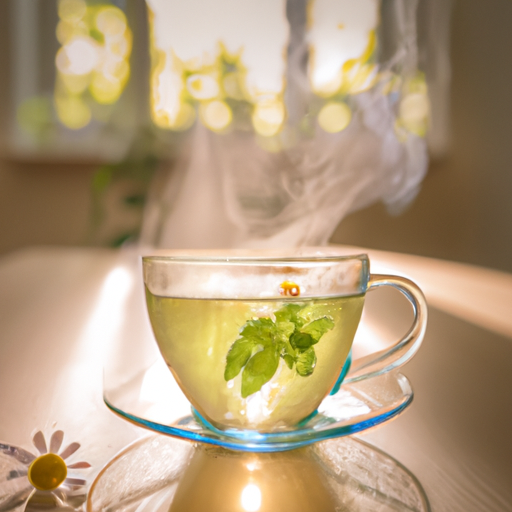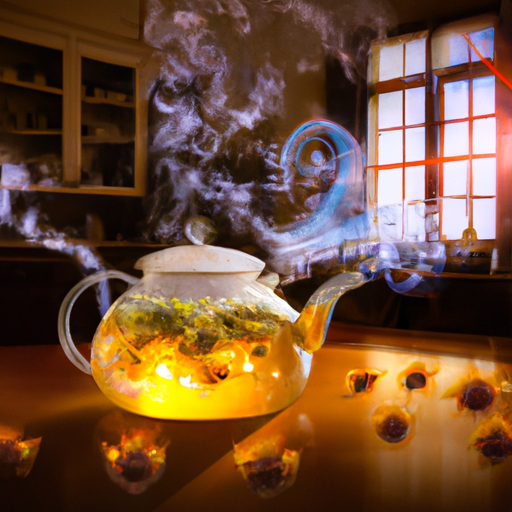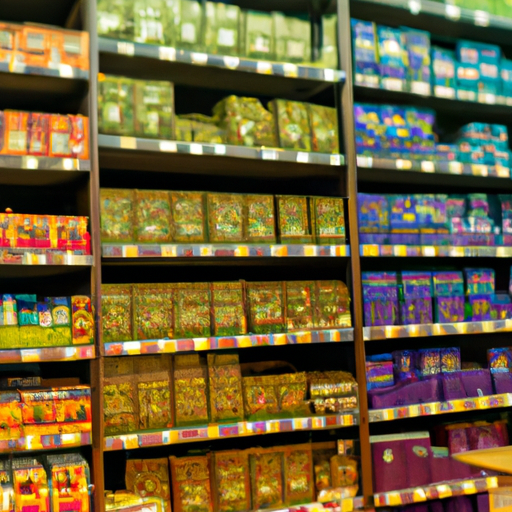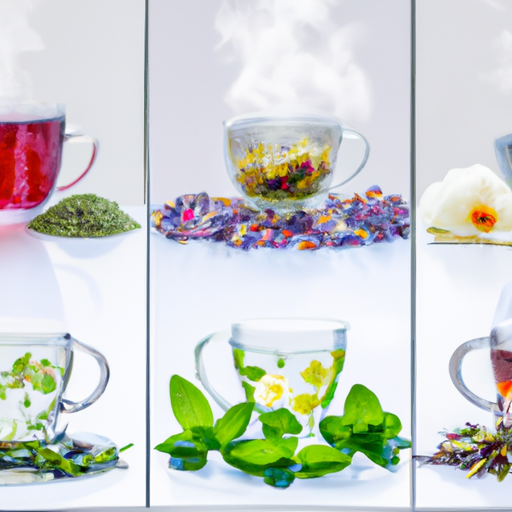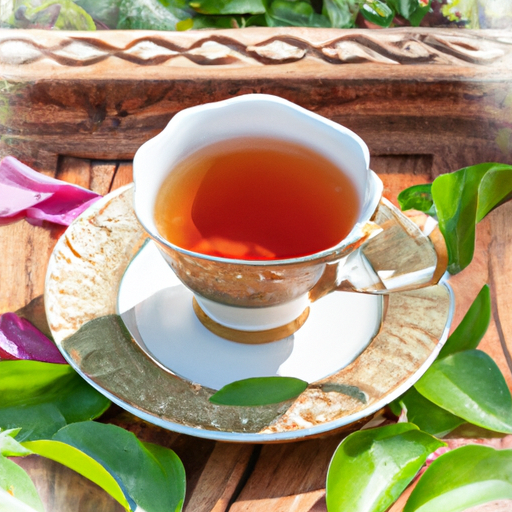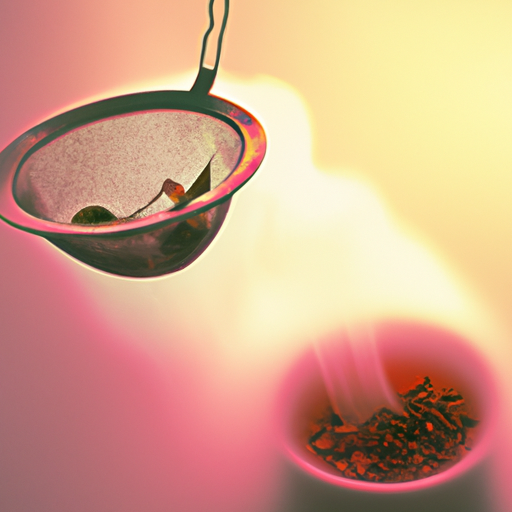I have always been a tea lover, but recently I discovered a whole new world of flavors and aromas with herbal teas. There is something so comforting about sipping on a warm cup of herbal tea, especially when it has a touch of sweetness to it.
But finding the perfect sweet herbal tea can be a bit of a challenge. That’s why I embarked on a mission to uncover the secrets of what makes a good sweet herbal tea. In this article, I will share with you my findings, from understanding the basics of herbal tea to choosing the right herbs and finding the perfect balance of sweetness.
We will also explore brewing techniques for maximum flavor and delve into the wonderful world of flavor profiles. And of course, I will reveal how to enhance the sweetness naturally, so you can savor the perfect cup of sweet herbal tea.
Get ready to indulge your taste buds and discover a whole new level of tea enjoyment. Let’s dive in!
Key Takeaways
- Herbal teas are caffeine-free and offer a variety of flavors and health benefits.
- Choosing the right blend of herbs is crucial for creating a delicious and sweet herbal tea.
- Natural sweeteners like honey, stevia, or maple syrup can enhance the sweetness without overpowering flavors.
- Experimenting with brewing techniques, steeping time, and temperature can create different flavor profiles in sweet herbal tea.
Understanding Herbal Tea Basics
So, you’re looking to understand the basics of herbal tea, huh? Well, you’ve come to the right place.
Herbal tea, also known as tisane, is a delightful beverage made from the infusion of various herbs, fruits, flowers, and spices. Unlike traditional tea, which is derived from the Camellia sinensis plant, herbal tea is caffeine-free and offers a wide range of flavors and health benefits.
When it comes to choosing tea blends, the possibilities are endless. You can find blends that are soothing and calming, such as chamomile or lavender, perfect for winding down after a long day. If you’re looking for an energizing boost, try blends with peppermint or ginger. For a fruity and refreshing option, consider blends with hibiscus or lemon verbena. The key is to experiment and find the flavors that appeal to your taste buds.
Apart from their delicious taste, herbal teas also offer numerous health benefits. Many herbs used in tea blends have been used for centuries in traditional medicine for their healing properties. For example, chamomile is known for its calming effects on the nervous system, while ginger can aid in digestion. It’s important to research the specific herbs you’re interested in to understand their potential benefits.
Now that you have a basic understanding of herbal tea, let’s move on to the next section, where we’ll explore the process of choosing the right herbs for your personalized tea blends.
Choosing the Right Herbs
When it comes to selecting herbs for your cup of delight, you want to make sure you don’t end up with a concoction that tastes like a failed science experiment. Choosing the right blend of herbs is crucial in creating a sweet herbal tea that satisfies your taste buds. The key is to pair herbs that complement each other and create a unique flavor combination.
Start by selecting a base herb, such as chamomile or rooibos, which provides a solid foundation for the tea. These herbs have a naturally sweet and floral taste that forms the backbone of your blend. Next, consider adding herbs like mint or lemon verbena for a refreshing twist, or lavender for a delicate floral note. Experimenting with different combinations can lead to surprising and delightful results.
To find the perfect balance of sweetness, you can incorporate herbs like stevia or licorice root, which naturally add a touch of sweetness without the need for sugar. Alternatively, you can use dried fruits like apples or berries to infuse your tea with a natural and fruity sweetness.
With the right herbs in your arsenal, you can create a delicious sweet herbal tea that’s both soothing and invigorating.
Next, we’ll explore the art of finding the perfect balance of sweetness in your cup of tea.
Finding the Perfect Balance of Sweetness
When it comes to finding the perfect balance of sweetness in herbal tea, I’ve learned that using natural sweeteners can greatly enhance the taste. Whether it’s a touch of honey, a sprinkle of stevia, or a splash of maple syrup, these alternatives can add just the right amount of sweetness without overpowering the herbal flavors.
Additionally, I’ve found that experimenting with different ratios of sweeteners can help to create a personalized and enjoyable tea experience. By gradually adjusting the amount of sweetener used, I’ve been able to find the perfect balance that suits my taste buds.
Natural sweeteners to enhance taste
To enhance the taste of your sweet herbal tea, you can try adding natural sweeteners like honey or stevia for a delightful and guilt-free indulgence. Natural sweeteners are great alternatives to sugar, as they provide a sweet taste without the negative health effects.
When it comes to honey, choose raw, unprocessed varieties for the best flavor. Stevia, on the other hand, is a plant-based sweetener that’s incredibly sweet, so a little goes a long way.
Incorporating natural sweeteners into your herbal tea not only adds sweetness but also brings out the flavors of the herbs. Honey adds a subtle floral note, while stevia provides a clean, sweet taste. Experiment with different ratios of sweeteners to find the perfect balance of sweetness for your taste buds. This will allow you to create a truly personalized and enjoyable cup of sweet herbal tea.
Experimenting with different ratios
Try playing around with various combinations of natural sweeteners to discover the perfect balance of flavors in my personalized cup of herbal tea. I enjoy trying different blends and creating unique flavor combinations.
One of my favorite combinations is a mix of stevia and honey, which gives a nice sweetness without overpowering the herbal notes. Another option is to use maple syrup for a rich and earthy sweetness. Agave nectar is also a great choice, providing a mild and smooth sweetness.
By experimenting with different ratios of these natural sweeteners, I’ve been able to find the perfect balance that suits my taste buds.
Now, let’s move on to brewing techniques for maximum flavor, where I’ll share some tips and tricks to enhance the taste even further.
Brewing Techniques for Maximum Flavor
For the most flavorful cup of sweet herbal tea, make sure you brew it using the right techniques. The brewing temperature and steeping time are key factors that can greatly affect the taste of your tea.
To achieve maximum flavor, it’s important to use the appropriate water temperature. Generally, herbal teas should be brewed at a temperature between 180°F (82°C) and 205°F (96°C). This range allows the flavors to fully develop without extracting any bitterness.
Steeping time is another crucial aspect to consider. Different herbal teas require varying steeping times, but on average, a steeping time of 5-7 minutes is recommended. This allows the herbs to release their essential oils and flavors into the water. However, it’s important not to oversteep the tea, as it can lead to a bitter taste.
Once you have mastered the brewing techniques, you can move on to exploring different flavor profiles. By adjusting the steeping time and temperature, you can create a variety of flavors, from light and delicate to bold and robust.
So, let’s dive into the exciting world of exploring flavor profiles in sweet herbal tea.
Exploring Flavor Profiles
Embark on a journey through a tantalizing palette of flavors, each painting a unique story in every sip of this enchanting elixir. When it comes to sweet herbal teas, pairing them with desserts can elevate the taste experience to a whole new level.
Imagine savoring a warm cup of chamomile tea alongside a slice of honey cake, or indulging in a rich chocolate brownie while sipping on a fragrant lavender tea. The combination of the herbal tea’s natural sweetness and the dessert’s decadence creates a harmonious symphony of flavors that dance on your taste buds.
But the appeal of sweet herbal teas goes beyond their delectable taste. These brews also offer a myriad of health benefits. For instance, hibiscus tea, with its vibrant red color and tart sweetness, is not only refreshing but also packed with antioxidants that can help reduce inflammation and lower blood pressure. Similarly, peppermint tea, with its refreshing minty sweetness, can aid digestion and soothe an upset stomach.
As we delve into enhancing the sweetness naturally, we’ll discover the secrets to creating a perfectly balanced cup of sweet herbal tea that’ll leave you craving for more.
Enhancing the Sweetness Naturally
Delve into the art of naturally enhancing the sweetness of your tea, and unlock a world of exquisite flavors that’ll transport your taste buds to new heights.
When it comes to herbal teas, there are various ways to enhance their natural sweetness without relying on artificial sweeteners. One method is to select herbs and spices that have inherent sweetness, such as cinnamon or licorice root. These ingredients not only add a delightful aroma to your tea but also offer numerous health benefits. For instance, cinnamon has been shown to regulate blood sugar levels, while licorice root can soothe the digestive system.
Another way to enhance the sweetness of herbal tea is to infuse it with fruits or flowers. Fruits like berries or citrus slices can add a burst of natural sweetness, as well as a refreshing tang. Edible flowers, such as rose petals or lavender, not only contribute to the tea’s fragrance but also impart a delicate sweetness. These natural additions not only enhance the flavor of your tea but also provide additional nutrients and antioxidants.
By enhancing the aroma and naturally sweetening your herbal tea, you can create a truly indulgent experience for your taste buds. Savoring the perfect cup is all about appreciating the intricate flavors and taking the time to enjoy every sip.
So, let’s dive into the next section and explore the art of savoring the perfect cup of sweet herbal tea.
Savoring the Perfect Cup
Indulge in the art of savoring a cup of perfection, allowing the exquisite flavors to envelop your senses and transport you to a world of blissful tranquility. When it comes to enjoying a good sweet herbal tea, the savoring techniques and flavor combinations play a crucial role in enhancing your overall experience.
Here are four savoring techniques to help you make the most of your sweet herbal tea:
-
Take a moment: Before taking your first sip, close your eyes and inhale deeply. Allow the aromas to fill your nostrils, preparing your taste buds for the delightful journey ahead.
-
Sip slowly: Take small, deliberate sips to fully appreciate the flavors unfolding on your palate. Allow the sweet notes to linger, savoring each sip as if it were a decadent treat.
-
Pair with complementary flavors: Experiment with combining your sweet herbal tea with light snacks or desserts. For example, a citrusy tea can be paired with a slice of lemon cake to create a harmonious blend of flavors.
-
Temperature control: Pay attention to the temperature of your tea. Some sweet herbal teas taste best when served hot, while others are more enjoyable when chilled. Experiment with different temperatures to find your preferred sipping experience.
By employing these savoring techniques and exploring unique flavor combinations, you can truly elevate your enjoyment of a good sweet herbal tea. So go ahead, take a moment for yourself, and savor every sip of that perfect cup.
Frequently Asked Questions
Can herbal tea be sweetened with artificial sweeteners?
Using artificial sweeteners in herbal tea is like adding a splash of color to a black and white picture. Pros include zero calories, but cons include potential health risks. Alternatively, natural sweeteners like honey or stevia offer a healthier option.
Are there any herbal teas that are naturally sweet without the need for additional sweeteners?
Yes, there are herbal teas that are naturally sweet without the need for additional sweeteners. Some of the best herbal tea brands offer a variety of options that provide the benefits of herbal tea in a naturally sweet and delicious way.
What are some common herbal tea ingredients that can be used to enhance the sweetness naturally?
To naturally enhance the sweetness in herbal teas, you can use ingredients like stevia, licorice root, cinnamon, and dried fruits. Balancing the sweetness with other flavors like citrus or mint can create a more complex and enjoyable taste.
Can herbal teas be enjoyed both hot and cold?
Herbal teas can be enjoyed both hot and cold, offering a refreshing and soothing experience. Drinking herbal tea provides numerous health benefits and promotes overall wellness. To maximize flavor, brew the tea properly for maximum enjoyment.
Are there any herbal teas that have a naturally sweet taste without being overpowering?
There are several herbal tea flavor profiles that naturally have a sweet taste without being overpowering. These teas not only provide a delightful flavor but also offer numerous health benefits, making them a great choice for tea enthusiasts.
Conclusion
So there you have it, my friends. After extensive research and countless cups of herbal tea, I’ve discovered the secret to finding the perfect sweet herbal tea. It’s all about balance and exploring different flavor profiles. But here’s the ironic twist – the truth is, there isn’t one ‘perfect’ sweet herbal tea. It’s all subjective and depends on personal preference. So go ahead, try different herbs, experiment with brewing techniques, and find your own version of sweet perfection. Happy sipping!

